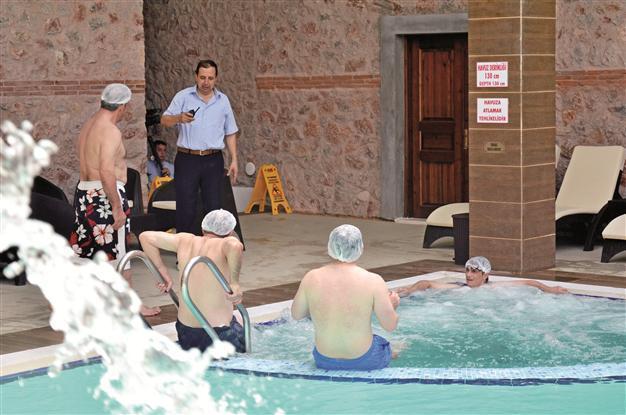Visitors flock back to Roman spring in Turkey's northwestern town
KOCAELİ - Anatolia News Agency

The spring has different swimming pools for women and men as well as a Turkish bath, sauna, steam rooms, a salt room, massage rooms and mud rooms. AA photos
Demonstrating that it’s never too late to take advantage of the wisdom of the ancients, tourism officials in the northwestern province of Kocaeli’s Gölcük district have re-erected a hot springs facility on the site of a spring that was once used in Roman times for its therapeutic effects.Gölcük Mayor Mehmet Ellibeş said the Yazlık Spring dated back to the Roman period in the second century A.D. and that some other structures from the same period had survived in the region. He said they developed the spring project to take advantage of the area’s historical richness, adding that the municipality signed a protocol with the Culture and Tourism Ministry and that restoration work on the facility started in 2009.
The mayor said that within the excavation works, a number of artifacts from the Roman and Byzantine period had been unearthed, including a bath, sauna and coins.
Calling for entrepreneurs to come to the region and make investments, Ellibeş said an area of close to 700,000 square meters had been declared a thermal tourism facility.
The construction of the Yazlık Spring was inspired by Ottoman architecture, Ellibeş said.
Pools for men, women
“The Yazlık Spring has different swimming pools for women and men as well as a Turkish bath, sauna, steam rooms, a salt room, massage rooms and mud rooms. It is a place where people will benefit from healing pools for their health problems and at the same time, spend time in a spa center. Everything from a jacuzzi to massages is possible in this facility, which opened one month ago. Within a short time, the spring has drawn a lot of interest from people,” he said. “We unearthed the underground water and offered it to public service.”
Ellibeş said Kocaeli was known as an industrial city, but that it would soon become known as a thermal city thank to the new projects.
It is unfair for a treasure from the second century to remain underwater, the Gölcük mayor said. “We have made a step to remove this unfairness and now see that we have made a very good decision by constructing this facility because our people have great expectations from thermal facilities and springs. We reached our prior goal by meeting people’s demand for alternative health.”
Ellibeş said Health Ministry officials had analyzed the water and mud of the spring. “Our mud and water were also sent to the Atomic Energy Authority. Their healing effect on skin diseases, rheumatism, as well as neurological and bone problems was confirmed.”
















